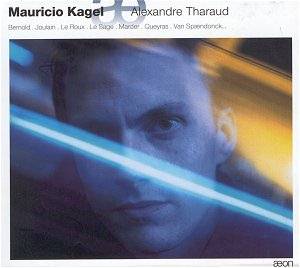Kagel’s music is unlike anything else in 20th
Century music, and defies any attempt at easy classification. It often
revisits older music or various musical forms and styles in an overtly
iconoclastic manner with some devastating black humour. It also has
some theatrical gesturing. For Kagel, things are never taken for granted,
even in works such as Ludwig van, subtitled Homage
to Beethoven, conceived as a sincere homage to this composer. It
includes a number of quotations from Beethoven’s works and revisits
them in a contemporary perspective, as if questioning them as to their
actual present significance. The most obvious example of this is, I
think, the eighth movement in which the final Ode to Joy from
Beethoven’s Ninth Symphony is hammered out by baritone and piano, as
if asking whether Schiller’s and Beethoven’s generous, if utopian vision
of universal brotherhood is still valid in our times. This score was
originally written to accompany a film on Beethoven made during Beethoven
year in 1970 and reworked as the present piece for small ensemble, baritone
and small chorus.
Rrrrrrr... is a radiophonic piece (the
composer calls it a Radio-Phantasie) made of forty-one autonomous
pieces, all with titles beginning with the letter R as found in a musical
encyclopaedia (e.g. ragtime, râga) and scored for various forces.
Some of them, originally composed for organ, have been transcribed for
piano (two or four hands), and are the ones recorded here. One of them
(Rossignols enrhumés) is the most striking in that it
has been transcribed for prepared piano, thus conjuring a mysterious
sound world. The whole set is highly entertaining and not without a
pinch of tongue-in-cheek humour.
Der Eid des Hippokrates ("Hippocrates’
Oath") for piano (three hands) is yet another curious short work
of black humour. One hand keeps softly drumming on the piano as if spelling
the first words of Hippocrates’ Oath. The very title of Unguis
incarnatus est is another revealing example of Kagel’s sense
of humour (echoes of Satie here) in that unguis incarnatus is
a medical term whereas the phrase incarnatus est, of course,
originates from the Mass’s Credo. It is written for piano and ... (i.e.
any bass sustaining instrument, in this case a double bass). It also
includes theatrical gestures, especially at the very end, when the exhausted
patient gives out his last breath. MM 51 is for piano
and metronome (set at Maelzel 51, of course). This short score is, so
to say, a skeleton of Schönberg’s Begleitungsmusik zu einer
Lichtspielszene although totally unrelated to it, musically
speaking. The various musical episodes roughly follow some hidden scenario
similar to that devised by Schönberg and allude to some movie clichés
of yesteryear. They unfold over the imperturbably ticking metronome
(which sometimes cause rhythms to run riot) until the poor victim is
brutally strangled at the end.
As already mentioned, Kagel’s music is decidedly idiosyncratic,
and its impact greatly depends on how one is likely to react to his
emotional and musical content. It may amuse or irritate, it may fascinate
or be frankly boring; but it never leave you indifferent.
Alexandre Tharaud and his colleagues put all their
heart into this often whimsical music, and get deep under the surface
of these often ambiguous works. Above all, and most importantly, they
perform these pieces with utter earnestness. AEON’s production and recording
are again excellent. Kagel devotees will need no further recommendation;
others might have to sample this disc before eventually deciding whether
this music is for them or not.
Hubert Culot

